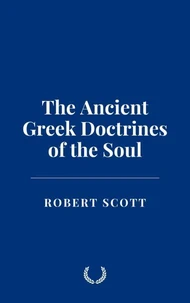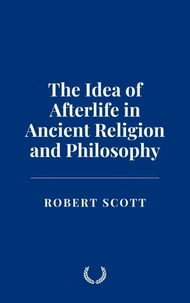Aeschylus and the Tragedy in Classical Athens
Par :Formats :
Disponible dans votre compte client Decitre ou Furet du Nord dès validation de votre commande. Le format ePub est :
- Compatible avec une lecture sur My Vivlio (smartphone, tablette, ordinateur)
- Compatible avec une lecture sur liseuses Vivlio
- Pour les liseuses autres que Vivlio, vous devez utiliser le logiciel Adobe Digital Edition. Non compatible avec la lecture sur les liseuses Kindle, Remarkable et Sony
 , qui est-ce ?
, qui est-ce ?Notre partenaire de plateforme de lecture numérique où vous retrouverez l'ensemble de vos ebooks gratuitement
Pour en savoir plus sur nos ebooks, consultez notre aide en ligne ici
- FormatePub
- ISBN8230358022
- EAN9798230358022
- Date de parution07/02/2025
- Protection num.pas de protection
- Infos supplémentairesepub
- ÉditeurIndependently Published
Résumé
This book provides an in-depth exploration of Aeschylus, the seminal figure in the development of Greek tragedy, analyzing his works, themes, and lasting impact on both ancient and modern thought. It traces the evolution of tragedy from its early religious roots to the sophisticated dramatic forms established by Aeschylus, focusing on his unique contributions to the genre. Aeschylus' treatment of divine justice, human suffering, fate, and moral responsibility is examined through detailed analysis of his major plays, including the Oresteia trilogy, Prometheus Bound, and The Persians.
The book explores how Aeschylus' tragic heroes grapple with the interplay of divine and human forces, and how his exploration of justice reflects the political and philosophical climate of Athens in the 5th century BCE. The work also delves into the religious and social context in which Aeschylus wrote, highlighting his innovations in the structure of tragedy and his influence on later dramatists such as Sophocles and Euripides.
The final chapters expand on Aeschylus' continued relevance in the modern era, showing how his themes of justice, morality, fate, and the role of the individual resonate in contemporary philosophy, theatre, and political thought. Through this comprehensive analysis, the book demonstrates that Aeschylus' tragedies remain an essential source of reflection on the human condition, offering timeless insights into the moral and existential challenges that continue to shape our world.
The book explores how Aeschylus' tragic heroes grapple with the interplay of divine and human forces, and how his exploration of justice reflects the political and philosophical climate of Athens in the 5th century BCE. The work also delves into the religious and social context in which Aeschylus wrote, highlighting his innovations in the structure of tragedy and his influence on later dramatists such as Sophocles and Euripides.
The final chapters expand on Aeschylus' continued relevance in the modern era, showing how his themes of justice, morality, fate, and the role of the individual resonate in contemporary philosophy, theatre, and political thought. Through this comprehensive analysis, the book demonstrates that Aeschylus' tragedies remain an essential source of reflection on the human condition, offering timeless insights into the moral and existential challenges that continue to shape our world.
This book provides an in-depth exploration of Aeschylus, the seminal figure in the development of Greek tragedy, analyzing his works, themes, and lasting impact on both ancient and modern thought. It traces the evolution of tragedy from its early religious roots to the sophisticated dramatic forms established by Aeschylus, focusing on his unique contributions to the genre. Aeschylus' treatment of divine justice, human suffering, fate, and moral responsibility is examined through detailed analysis of his major plays, including the Oresteia trilogy, Prometheus Bound, and The Persians.
The book explores how Aeschylus' tragic heroes grapple with the interplay of divine and human forces, and how his exploration of justice reflects the political and philosophical climate of Athens in the 5th century BCE. The work also delves into the religious and social context in which Aeschylus wrote, highlighting his innovations in the structure of tragedy and his influence on later dramatists such as Sophocles and Euripides.
The final chapters expand on Aeschylus' continued relevance in the modern era, showing how his themes of justice, morality, fate, and the role of the individual resonate in contemporary philosophy, theatre, and political thought. Through this comprehensive analysis, the book demonstrates that Aeschylus' tragedies remain an essential source of reflection on the human condition, offering timeless insights into the moral and existential challenges that continue to shape our world.
The book explores how Aeschylus' tragic heroes grapple with the interplay of divine and human forces, and how his exploration of justice reflects the political and philosophical climate of Athens in the 5th century BCE. The work also delves into the religious and social context in which Aeschylus wrote, highlighting his innovations in the structure of tragedy and his influence on later dramatists such as Sophocles and Euripides.
The final chapters expand on Aeschylus' continued relevance in the modern era, showing how his themes of justice, morality, fate, and the role of the individual resonate in contemporary philosophy, theatre, and political thought. Through this comprehensive analysis, the book demonstrates that Aeschylus' tragedies remain an essential source of reflection on the human condition, offering timeless insights into the moral and existential challenges that continue to shape our world.






















